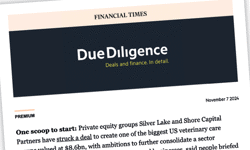The friend was trying to be helpful about David Montgomery’s future career moves following his ousting in January as founder and chief executive of Mecom, the pan-European newspaper group.
Surely newspapers were a lost cause, wouldn’t it be far better to try something entirely different, his friend suggested?
“I replied, well I’m not really qualified to do anything else. I can play the piano a little bit,” Montgomery, the former chief executive of the Mirror Group, told him.
“Well you could become a pianist in a brothel. That would be a really secure job,” noted the friend.
It won’t come to brothels for Montgomery and anyway the 62-year-old retains a firm belief in the future of newspapers.
He was speaking in Mecom’s fifth floor eerie in London’s Jermyn Street, where he was still beavering away at his post until the last as if his future depended on it.
The company had put out a statement about Montgomery’s “planned retirement” at the end of January.
That of course was complete nonsense.
It may have been planned, but it was certainly no retirement.
Major shareholders in the company, Aviva and Legal & General, had made it clear that they wanted Montgomery out.
They were so intransigent on the issue that they were prepared to call an extraordinary general meeting to remove him unless he went “voluntarily”.
The big outstanding question still hanging in the air when he left was WHY?
“I can’t elaborate for a variety of reasons. As a principle reason, I don’t want to stir up any controversy surrounding the company,” says Montgomery, who remains a shareholder.
“The company is in good condition. It delivered what it promised and hopefully it will prosper and become more successful,” the controversial Ulsterman added.
It was Montgomery who, after extensive travel around Europe, spotted the opportunity and assiduously bought newspapers in Germany, Poland, Norway, Denmark and the Netherlands – more than 300 titles in all with nearly as many websites - and then floated the company.
Mecom had, of course, been hit severely by the recession like everyone else but had weathered the storm – just - with the help of disposals and a rights issue.
“The only thing I will say on the record is that the trading statement announced in January in what was still a very difficult trading year showed extremely positive results,” Montgomery explains.
In the trading statement, Mecom said underlying profits were expected to be around €155 million (£133 million) for 2010 – €11 million higher than the previous year.
According to Montgomery, the 2010 results actually exceeded the future targets set by the shareholders for the company at the time of the rights issue in May 2009. Over the past twelve months alone, the share price has risen from 136p to around 266p.
But doesn’t all of that therefore make his departure under pressure all the more strange and inexplicable?
“The company delivered what it promised to shareholders, what it promised at the time of the rights issue and that is all really I will say about the circumstances of my departure. Nothing more than that,” insisted David Montgomery.
The classifieds crash
While nobody is saying anything on the record, all the signs are that Montgomery’s fate was sealed more than eighteen months ago when the global recession pushed newspaper classified advertising in Europe over the edge of a cliff.
Mecom titles across Europe lost €200 million in advertising revenue in eighteen months between 2008 and 2009 and it is a business where 80 per cent of advertising revenue falls to the bottom line – or not as the case may be.
Mecom was particularly badly affected because it had used debt to fund its rapid expansion.
“The people in the banks who loaned the money with great glee and enthusiasm were nowhere to be seen and the coffins in the basement were opened and this new team obviously kept for these situations emerged. They weren’t required to think just suck blood that’s all,” recalls Montgomery with increasing animation.
The former Mecom chief executive insists that the company was never in danger of going bust because of its assets and cash flow, though he concedes there was a danger it might have breached its banking covenants.
Mecom reported a full year pre-tax loss of £944 million for 2008. In early 2009, it sold its German newspapers, including the Berliner Zeitung and some of its Norwegian titles to reduce debt which had reached £669 million.
A re-financing deal was eventually done but not without boardroom rows and dramas.
Montgomery wouldn’t accept the board’s original deal with the banks and demanded a re-negotiation whereupon most board members resigned, including anther former chief executive of the Mirror Group John Allwood.
The overall deal finally agreed was still draconian and the company’s share price was on the floor.
The shareholders put up £141.5 million in new money through the rights issue under which the shareholders received six new shares for every one they already held at 1.5p. That was a huge discount to the previous already low closing price of 5p.
Aviva, L&G and Invesco, which has subsequently sold its 14 per cent stake, held Montgomery responsible for the millions they had lost.
“Monty was blamed for the recession. That’s more or less what it amounted to,” said someone who knows the company well.
The controlling shareholders then tried to install Patrick Tillieux, a former chief executive at broadcasters SBC and ProSiebenSat1 who wanted to sell off more of the company and concentrate on the Netherlands.
The board blocked the appointment and the sell-off strategy, and just as Montgomery was leaving, non-executive director Stephen Davidson was appointed as executive chairman with the task of finding a new chief executive.
So, is David Montgomery really going to wander off into the sunset to play his piano?
“I don’t intend to leave the industry. I continue to be very positive about the long-term future of newspapers. The general perception is that newspapers have had their day. I don’t agree,” says Montgomery who has a long history of not just editing and running newspapers but investing in them.
Buying up newspapers
The investing bit has been particularly frustrating.
The venture capital group 3i backed a Montgomery investment vehicle.
Together they bought the Belfast Newsletter and Derry Journal which were sold at a considerable profit to Johnston Press.
Montgomery thought it would have been better to keep and run the papers.
He was unable to persuade 3i to bid more than £80 million for Express Newspapers, which went for what has turned out to be the bargain basement price of £125 million to Richard Desmond.
They were the under-bidders for the Daily Telegraph and Montgomery also recommended 3i bought a 20 per cent stake in Axel Springer for €40 a share. His proposal was rejected and the stake was instead bought by Hellman & Friedman of New York and the price eventually reached €120.
“They (3i) wanted to have my expertise but they didn’t take my advice”, says Montgomery, who then went off to build up Mecom on his own.
Is he about to do something similar again?
He will certainly do something in the newspaper world in the UK or continental Europe, but for now he is probably being deliberately Delphic about what it is likely to be.
Will he raise capital and buy papers on the Mecom model or start with a clean sheet of paper with new people?
“Not decided. The issues are different country-by-country, territory-by-territory. I clearly like the European market but it is different north and south,” says Montgomery who while on his travels, likes turning up at some of the more obscure opera houses in Europe.
The UK challenge
If anybody wanted a real challenge in the newspaper industry then “you should try fixing the UK,” he believes but adds there is no obvious niche.
The odds are that Montgomery will probably end up choosing continental Europe for his next initiative but nothing has been ruled out at the moment.
His faith in the long-term future of newspapers does however carry a massive BUT.
“The BUT is that the practitioners in the industry have to wise up and anything we thought previously was a remedy to the ills of newspapers can be dismissed as inadequate because it hasn’t worked well enough,” says Montgomery.
“The reform that is needed has to be very radical and very creative and we have to convert an awful lot of people internally to the idea that they can no longer do things the way they have done them for decades, for generations, centuries even,” he argues.
Above all else, the former Mecom chief executive believes the newspaper industry has to divorce itself from its industrial past with everyone, whether journalists or sales people, working much more flexibly.
Smaller numbers? More skilled people?
“Clearly all of those, but the essence of it is flexibility. I don’t have all the solutions by any means but from my recent experience in Europe, I think I have some real ideas where newspapers can become much more interesting,” says Montgomery.
There are lessons to be learned, he believes, from Mecom’s Norwegian experience where some of the titles achieve nearly 100 per cent penetration by concentrating exclusively on local news.
They have also dropped sports coverage in the paper and concentrated sport entirely online – appropriate content on appropriate platforms, as Montgomery sees it.
“Why should you sit around until midnight before you press the button on the print machines simply because you are holding back to publish the football results when every one of your readers is using online,” asks Montgomery.
Local television for newspapers doesn’t work. He’s tried that and online is much better value.
Montgomery believes you could set up the infrastructure for a newspaper from scratch in about a week.
There would be a tiny permanent staff of commissioning department heads linked to an army of freelance journalists complete with efficient print contracts and outsourced sales.
He could do such a thing but he is more likely to raise money and buy, and right now he plans to travel round the old Mecom territories and other territories looking for opportunities.
“My preference is to continue to work to modernise the newspaper segment and my belief in the content and in the people who produce the content for newspapers is stronger today that it has even been, but they need to give a little”, he says.
So, David Montgomery will not be playing a piano in a brothel and he certainly will not be retiring.
Absolutely not.










